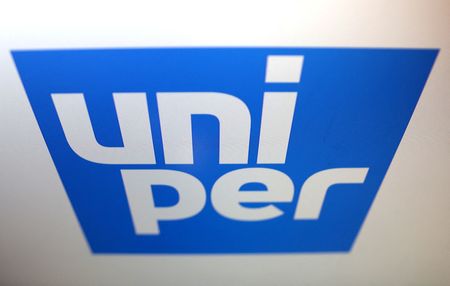By Christoph Steitz and Tom Käckenhoff
FRANKFURT/DUESSELDORF (Reuters) – Uniper, the largest corporate casualty of Europe’s energy crisis so far, said Berlin would need to pump as much as 25 billion euros ($25.8 billion) of additional equity into the struggling gas importer to cover losses incurred after Russia cut supplies.
The amended bailout deal reflects the cancellation of a gas levy designed to help German gas importers bear additional costs, and raises the tally for Uniper’s nationalisation to more than 51 billion euros.
Sources said last month that tens of billions in additional funding were necessary to stabilise Uniper after Berlin decided to scrap the levy, which would have allowed gas companies to pass on most of the higher procurement costs to customers.
“It’s about nothing less than a substantial portion of Germany’s gas bill, which will now be paid out of tax revenues – and not, as originally planned, through a gas surcharge,” Uniper Chief Executive Klaus Dieter Maubach said on Wednesday.
“Without this relief, our customers, including many municipal utilities, would inevitably have faced an even higher wave of costs,” he added.
Uniper’s shares closed 8.4% lower.
Under the most recent agreement, Berlin will subscribe to tranches of authorised capital totalling up to 25 billion euros to cover losses from outstanding Russian gas volumes until 2024, Germany’s largest gas importer said.
EU APPROVAL
The German Economy Ministry said this would happen “only to the extent that Uniper can demonstrate a need for capital (in particular in connection with replacement procurement costs)”.
Investors will vote on the deal – including up to 33 billion euros in state-backed equity, up to 18 billion euros in credit lines from state-lender KfW and 500 million to buy out Uniper parent Fortum – at a meeting on Dec. 19.
Uniper said it was in talks with the EU Commission, which needs to approve the rescue deal under state-aid and merger-control law, adding it expected to get the green light from Brussels before the planned shareholder meeting.
Maubach said government’s support was “indispensable” for Uniper, adding it was the only way the company could continue to exist and contribute to energy security.
Harald Seegatz, head of Uniper’s workers’ council and the group’s deputy supervisory board chairman, said he hoped EU approval would come quickly and that the Commission would not “impose any unjustified conditions”.
Uniper nearly collapsed after Russia’s Gazprom, its biggest supplier, halted gas flows earlier this year in what Berlin said was retaliation against sanctions over the war in Ukraine, which Moscow denies.
This not only triggered a 40 billion euro net loss, the biggest in German corporate history, but also forced Germany to nationalise the company to avoid what it described as a Lehman Brothers-style effect in the energy sector.
($1 = 0.9697 euros)
(Reporting by Christoph Steitz and Tom Kaeckenhoff; Additional reporting by Andreas Rinke and Maria Sheahan in Berlin; Editing by Madeline Chambers and Kirsten Donovan)

